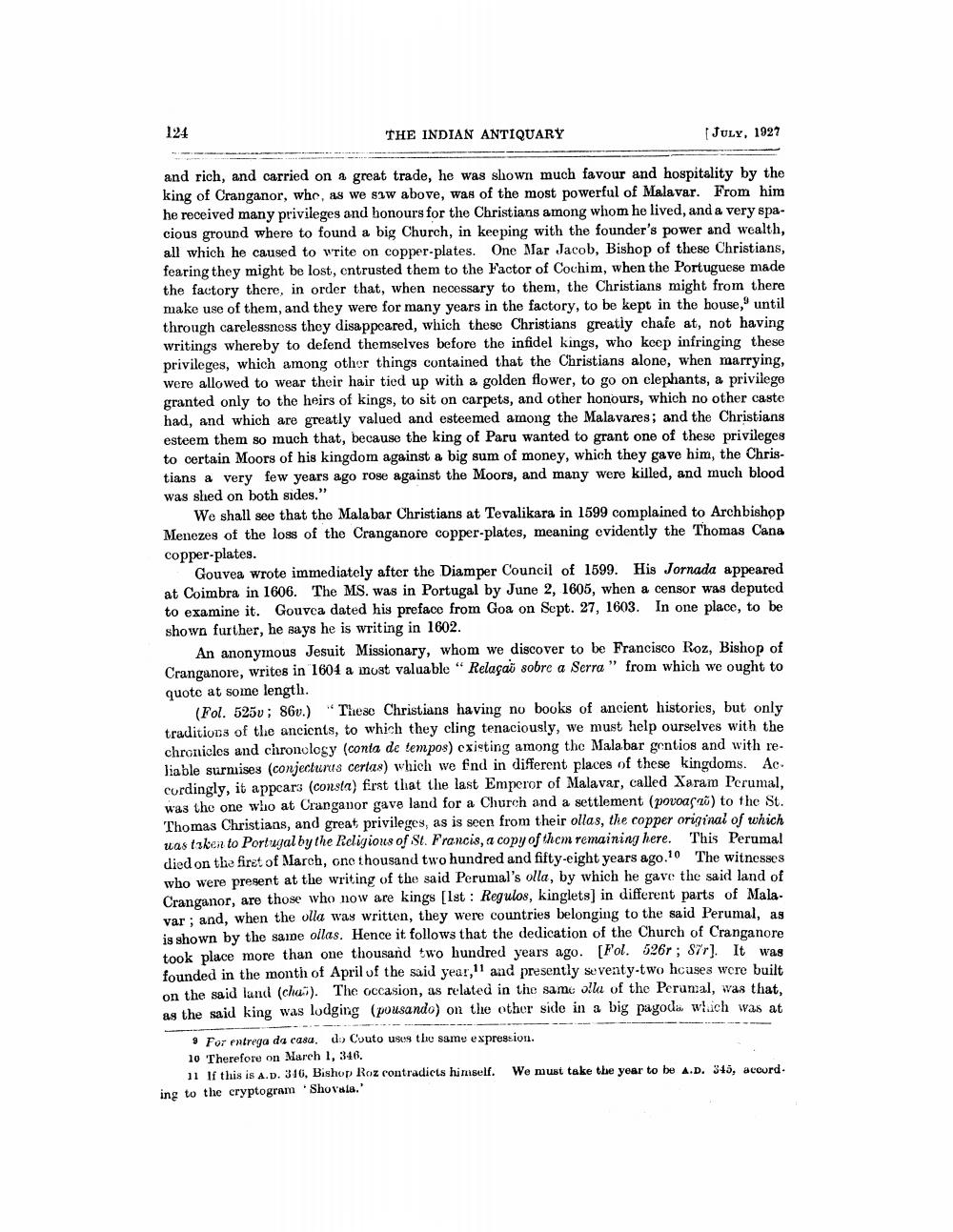________________
124
THE INDIAN ANTIQUARY
JULY, 1927
and rich, and carried on a great trade, he was shown much favour and hospitality by the king of Cranganor, whe, as we saw above, was of the most powerful of Malavar. From him he received many privileges and honours for the Christians among whom he lived, and a very spacious ground where to found a big Church, in keeping with the founder's power and wealth, all which he caused to write on copper-plates. One Mar Jacob, Bishop of these Christians, fearing they might be lost, entrusted them to the Factor of Cochim, when the Portuguese made the factory there, in order that, when necessary to them, the Christians might from there make use of them, and they were for many years in the factory, to be kept in the house, until through carelessness they disappeared, which these Christians greatly chafe at, not having writings whereby to defend themselves before the infidel kings, who keep infringing these privileges, which among other things contained that the Christians alone, when marrying, were allowed to wear their hair tied up with a golden flower, to go on elephants, a privilege granted only to the heirs of kings, to sit on carpets, and other honours, which no other caste had, and which are greatly valued and esteemed among the Malavares; and the Christians esteem them so much that, because the king of Paru wanted to grant one of these privileges to certain Moors of his kingdom against a big sum of money, which they gave him, the Christians a very few years ago rose against the Moors, and many were killed, and much blood was shed on both sides."
We shall see that the Malabar Christians at Tevalikara in 1599 complained to Archbishop Menezes of the loss of the Cranganore copper-plates, meaning evidently the Thomas Cana copper-plates.
Gouvea wrote immediately after the Diamper Council of 1599. His Jornada appeared at Coimbra in 1606. The MS. was in Portugal by June 2, 1605, when a censor was deputed to examine it. Gouvea dated his preface from Goa on Sept. 27, 1603. In one place, to be shown further, he says he is writing in 1602.
An anonymous Jesuit Missionary, whom we discover to be Francisco Roz, Bishop of Cranganore, writos in 1604 a must valuable " Relacai sobre a Serra " from which we ought to quote at some length.
(Fol. 5250; 86v.) "These Christians having no books of ancient histories, but only traditions of the ancients, to which they cling tenaciously, we must help ourselves with the chronicles and chronology (conta de tempos) existing among the Malabar gentios and with re. Jiable surmises (conjecturus certas) which we fnd in different places of these kingdoms. Ac. cordingly, it appears (consta) first that the last Emperor of Malavar, called Xaram Perumal. was the one who at Cranganor gave land for a Church and a settlement (povoaswo) to the St. Thomas Christians, and great privileges, as is seen from their ollas, the copper original of which was taken to Portugal by the Religious of St. Francis, a copy of them remaining here. This Perumal died on the first of March, one thousand two hundred and fifty-eight years ago 10 The witnesses who were present at the writing of the said Perumal's olla, by which he gave the said land of Cranganor, are those who now are kings [1st: Regulos, kinglets) in different parts of Malavar; and, when the olla was written, they were countries belonging to the said Perumal, as is shown by the same oilas. Hence it follows that the dedication of the Church of Cranganore took place more than one thousand two hundred years ago. [Fol. 526r; 87r]. It was founded in the month of April of the said year, and presently seventy-two hcuses were built on the said land (cha). The occasion, as related in the same olla of the Perumal, was that, as the said king was lodging (pousando) on the other side in a big pagoda wluch was at
For entrega da casa. do Couto uses the same expression. 10 Therefore on March 1, 346.
11 If this is A.D. 316, Bishop Roz contradicts himself. We must take the year to be A.D. 315, acord. ing to the cryptogram Shovala.'




